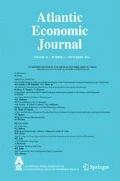Abstract
We consider a dynamic game model of a two-country monetary union. Governments (fiscal policies) pursue national goals while the common central bank’s monetary policy aims at union-wide objectives. For a symmetric demand shock, we derive numerical solutions of the dynamic game between the governments and the central bank. We consider conflicting (non-cooperative Nash equilibrium) and coordinated policy-making (cooperative Pareto solutions). We show that there is a trade-off between the deviations of instruments and targets from desired paths; the volatility of output and inflation increases when private agents react more strongly to changes in actual inflation.












Similar content being viewed by others
References
Başar, T., & Olsder, G. J. (1999). Dynamic noncooperative game theory (2nd ed.). Philadelphia: SIAM.
Behrens, D. A. & Neck, R. (2006). Approximating solutions for multi-decision-maker tracking problems. Working Paper, Klagenfurt: Klagenfurt University.
Dockner, E., et al. (2000). Differential games in economics and management science. Cambridge: Cambridge University Press.
Haber, G., Neck, R., & McKibbin, W. J. (2002). Global implications of monetary and fiscal policy rules in the EMU. Open Economies Review, 13(4), 363–379.
Hughes Hallett, A., & Petit, M. L. (1990). Cohabitation or forced marriage? A study of the costs of failing to coordinate fiscal and monetary policies. Weltwirtschaftliches Archiv, 126(4), 662–690.
Miller, M., & Salmon, M. (1985). Policy coordination and dynamic games. In W. H. Buiter & R. C. Marston (Eds.), International economic policy coordination (pp. 184–213). Cambridge: Cambridge University Press.
Petit, M. L. (1990). Control theory and dynamic games in economic policy analysis. Cambridge: Cambridge University Press.
van Aarle, B., Di Bartolomeo, G., Engwerda, J., & Plasmans, J. (2002). Monetary and fiscal policy design in the EMU: an overview. Open Economies Review, 13(4), 321–340.
Author information
Authors and Affiliations
Corresponding author
Rights and permissions
About this article
Cite this article
Neck, R., Behrens, D.A. A Macroeconomic Policy Game for a Monetary Union with Adaptive Expectations. Atl Econ J 37, 335–349 (2009). https://doi.org/10.1007/s11293-009-9186-6
Received:
Accepted:
Published:
Issue Date:
DOI: https://doi.org/10.1007/s11293-009-9186-6




